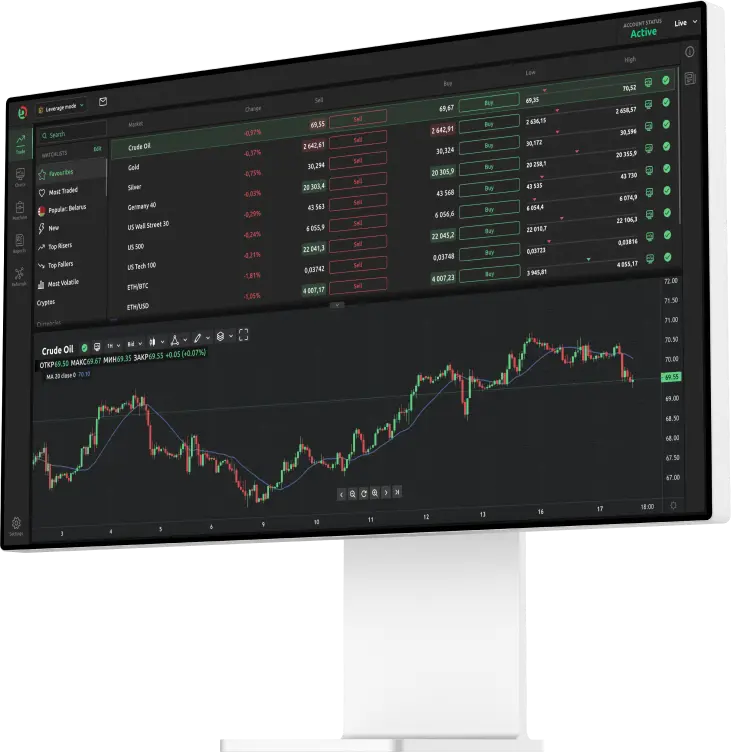The Italian stock market was in freefall as it became the European epicentre of the coronavirus, but its economy has been in trouble for some time

Picture the scene: your car has broken down on the motorway – and if things weren’t bad enough, torrential downpours begin while you wait at the side of the road to be rescued. This is kind of what’s been happening with the Italian stock market, albeit on a much grander scale.
Italy is now the European Union’s third-largest economy in terms of GDP following the UK’s departure from the trading bloc. But it’s an economy that’s been teetering on the edge for some time. Delve into data away from Italian stocks, and you begin to realise the true extent of the problem.
While real capita per income rose by 28 per cent in Germany from 1998 to 2008, the dial barely moved in Italy – effectively meaning living standards haven’t improved for 20 years. About 33 per cent of Italy’s young people are unemployed – and for the first time since the beginning of 2008, this level is higher than in nearby Spain.
The woes for the Italian stock market don’t end here. Italy has long been blighted with a vulnerable banking system and eye-wateringly high levels of public debt. Although some economies managed to dust themselves off following the bruising 2008 financial crisis, Italy was not one of them. It fell into recession three times over the following decade.
If the parlous state of the Italian stock market and the nation’s economy is the equivalent of your car breaking down, the coronavirus outbreak represents those torrential downpours: unforeseen, unpleasant and making matters much worse. In another stroke of devastatingly bad luck, northern parts of Italy succeeded Wuhan to become the epicentre of the shifting Covid-19 pandemic. Of all the countries in Europe, it has been worst affected by the outbreak.
At the time of writing, there have been over 101,000 confirmed cases across Italy, and official figures suggest 11,591 have died. Despite this extraordinary death toll, some Italian experts have warned it is possible that the true number of fatalities are being underestimated. There are glimmers of hope that infection rates are starting to slow – but with lockdown measures set to remain well into April, the country isn’t out of the woods yet.
Here, we’re going to focus on the financial impact and look at how Italy share market has been faring since the outbreak began in Lombardy, a region in the country’s north. We’ll also explore the economic measures that are being implemented to help Italy survive the joint threats it’s facing right now and examine the state of the Italian stock market today.
Italian stock market news
The stock market in Italy had been gradually accumulating for the second half of 2019, with the FTSE MIB its primary benchmark index. On 3 June 2019, it stood at 19,874, rising 18.2 per cent to 23,506 points by 30 December. Growth was far from over – and it hit highs of 25,483 on 19 February. The index reflects the nation’s 40 most-traded companies.
This stock market surge came despite two cases of Covid-19 being confirmed in Rome at the end of January, with Italy opting to suspend flights to China. But a day after that high watermark was achieved on the 0'>FTSE MIB, things were about to worsen rapidly. The first case in Lombardy came on 20 February, and small towns were placed under quarantine on 23 February. Cases soon began to double every few days. Schools were closed nationwide on 4 March, a number of large provinces went into lockdown on 8 March, and this extended nationwide on 9 March.
A swift and brutal Italian stock market crash began. By the end of February, the 0'>FTSE MIB had slid to 21,984 – down 13.7 per cent. Yearly lows would quickly follow. By 16 March, it had hit 14,153. To put this into perspective, that’s about 44 per cent off where it was just four weeks earlier.
Securities regulators in Italy have acted swiftly to try and stem the damage to Italian stocks. Short-selling shares in any company that’s listed in the country has been banned for a three-month period – a move designed to “restore the market’s integrity”. This controversial practice is where traders borrow shares and sell them, all with a view to buying them back when prices eventually fall. European bodies reacted positively to this move, which has now been replicated to some extent by the likes of France and Belgium.
In terms of Italian stock market news to watch out for, it’s worth keeping a close eye on how coronavirus cases continue to develop in the country. Although infections may be starting to slow, parts of the nation’s healthcare system are overwhelmed – and this could sadly lead to a higher number of fatalities despite the valiant efforts of doctors and nurses.
Italian stocks are likely to be bruised by the undeniable disruption that the coronavirus outbreak will have on its already embattled manufacturing sector. The country’s output had already been falling for 17 consecutive months before Covid-19 struck, and the disease is set to catalyse the rate of decline. Tourism generated 13.3 per cent of Italy’s GDP in 2019 – and will undoubtedly take a substantial hit during the crucial summer season. Even if Italy begins to return to normal in May or June, travel restrictions in other countries could remain in place well beyond this.
There are also worries about whether local banks can withstand all of this economic turmoil – and the impact this will have on the stock market in Italy. A large chunk of the country’s sovereign bonds – that is, debt issued by the government – is owned by domestic financial institutions. This effectively means that the fate of the Italian economy and the banks are tied – if one goes down, it’ll take the other with it.
Italian stock market crash: What next?
Suspending mortgage payments may seem like a necessity, but it’s entirely possible that this could cause further headaches and exert extra pressure on the banks.
Italy is hoping for support from the European Union as it tries to navigate this economic mess, but the country has been left exasperated by the trading bloc’s slow response. This could exacerbate anti-EU sentiment across Italy – disdain that could prove calamitous for the union given how recent Brexit was.
EU leaders have been struggling to agree on how to handle the crisis, and exactly what type of support Italy and other coronavirus-ravaged members should receive. On 26 March, they gave themselves another two weeks to come up with a solution. Italy has been spearheading calls for the creation of new bonds backed by the EU that would fund healthcare and stimulate the economy, but the likes of Germany are worried about the prospect of creating debt that is shared by all.
There are so many unknowns as the coronavirus crisis continues and so much at stake. At the moment, it’s a sad but unescapable truth that Italy could become one of the biggest financial stories of 2020, and finding reliable Italian stocks to invest in could get harder. First, their car broke down. Now it’s started raining.
FURTHER READING: Stock market crash 2020: what is going to happen next?
FURTHER READING: Three ways to make money with stock index investing

